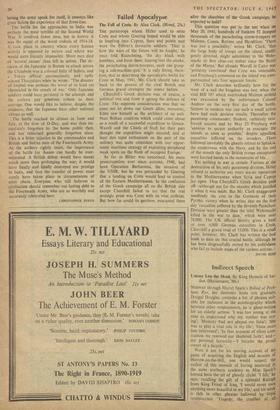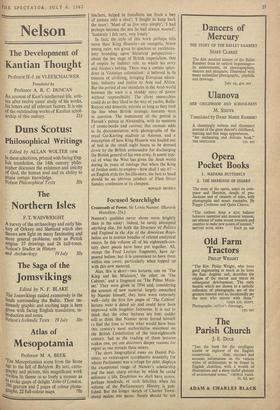Indi rect Speech Uneasy Lies the Head. By King Hussein of
Jor- dan. (Heinemann, 30s.) MIDWAY through Muriel Spark's Ballad of Peck- ham Rye, her daemonic Scots arts graduate, Dougal Douglas, compiles a list 3f phrases suit- able for inclusion in the autobiography which, between other employments, he is ghost-writing for an elderly actress. 'I was too young at the time to understand why my mother was cry- ing'; 'Memory had not played me false'; 'She was to play a vital role in my life'; 'Once more fate intervened'; 'In that moment of silent cony munion we renewed our shattered faith'; and- my personal favourite—'I became the proud owner of a bicycle.'
Were it not for his moving account of the pains of acquiring the English and accents of Harrow-on-the-Hill, one would suspect the author of this memoir of having mastered in the same northern academy as Miss Spark's horned hero the art of ghostly cliché. 'I felt,' be says, recalling the gift of a splendid Raleigh from King Feisal of Iraq, 'I would never owe anything more beautiful in my life,' and his work is rich in other phrases hallowed by royal reminiscence. 'Tragedy, the cruellest of all
teachers, helped to transform me from a boy of sixteen into a man'; 'I fought to keep back the tears'; 'Most of us live very simply'; 'I had perhaps become the son he had always wanted'; `Suddenly I felt very, very lonely.'
In fact, the style of this work perhaps tells more than King Hussein—an energetic, brave young ruler, not given to spacious or recrimina- tory brooding upon historical perspectives— about the last stage of British imperialism, that of empire by indirect rule, to which his story and Jordan's belong. There was a certain splen- dour in Victorian colonialism: it believed in its mission of civilising, bringing European educa- tion, industry and justice to Asia and Africa. But the period of our mandates in the Arab world between the wars is a shoddy story of power without responsibility. The client monarchies could do as they liked in the way of yachts, Rolls- Royces and domestic misrule so long as they toed the line when British strategic interests were in question. The monument of the period is Farouk's palace at Alexandria, with its museum cf comic-books and curiosa; this memoir adds to its documentation with photographs of the royal Go-Karting stadium at Amman, and a description of how King Hussein was hauled out of bed in the small night hours to be dressed down by the British ambassador for discharging the British general of his own army. It seems typi- cal of what the West has given the Arab world during its years of tutelage that when the King of Jordan seeks to employ—how shall I say it?— an English style for his life-story, the best to hand should be an obvious product of Fleet Street Sunday confession at its cheapest.
RONALD BRYDEN











































 Previous page
Previous page